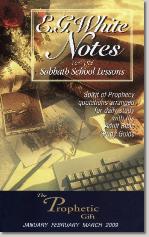|
||||||||||||||||||||
Commentary on "The Authority of the Prophets"
Day 7: Friday, February 20, 2009
The final part of the current lesson is quoting from a statement made in 1982 by an ad hoc committee of the General Conference on the relationship between the Bible and Ellen G. White. The purpose of this statement, as it is emphasized by Pfandle, is to “avoid two extremes: 1. regarding these writings as functioning on a canonical level identical with Scripture; 2. considering them as ordinary Christian literature”
Problems
There are two denials of the statement that are contradictory:
Denials:
"(1) We do not believe that the quality or degree of inspiration in the writings of Ellen White is different from that of Scripture."
"(4) We do not believe that the writings of Ellen White may be used as the basis of doctrine.”
Why can inspired writings from the Bible be the basis of doctrine and equally inspired writings from outside the Bible can’t? Is not inspiration sufficient, is not “Thus says the Lord” sufficient for establishing a doctrine? How does “thus says the Lord” have less authority in one context than another? When God speaks, is it not entirely trustworthy?
“(2) We do not believe that the writings of Ellen White are an addition to the canon of Sacred Scripture.”
Even if theoretically they are not an addition to the canon, how does this distinction function in the practical life? If we are instructed that there is no difference between the inspiration of the Bible and the Ellen White’s writings, on what basis are people supposed to consider these fresh revelations as anything other than additions to the previous revelation? The Bible’s books contain revelation, and Adventists claim that Ellen White’s writings do also; consequently, these later revelations function alongside the previous revelation.
“(3) We do not believe that the writings of Ellen White function as the foundation and final authority of Christian faith as does Scripture. “
The Bible remains the final authority only if it is allowed to be interpreted freely even if it contradicts Ellen’s writings. However, the assumption that Ellen’s writings are as inspired as the Bible does not allow contradictions between inspired writings, and consequently the Bible is not allowed to contradict Ellen’s writings. It is assumed from the start that, because Ellen’s writings are as inspired as the Bible, they are not in conflict with the message of the Bible, rightly understood. It is assumed that what we read in the Bible does not contradict what Ellen White wrote. It is assumed that the Bible as the final authority will not contradict the lesser authority of Ellen White.
But this assumption will lead inevitably to the conclusion that the Bible cannot be the final authority if its message contradicts Ellen White’s writings. Appealing to the Bible for rejecting the Investigative Judgment is not a valid appeal to the Bible as the final authority, according to the Adventists’ view. The Bible is indeed the final authority ONLY if it is interpreted in harmony with Ellen’s writings. That’s simply a denial that the Bible is the final authority if Ellen’s writings play such a decisive role. If the Bible cannot be interpreted without qualifications, without any other external points of reference, it is not the final authority.
“(5) We do not believe that the study of the writings of Ellen White may be used to replace the study of Scripture.”
Unstated qualification: As far as the study of the Bible does not replace the study of Ellen White’s writings. Taking one without the other is, to the Adventist, tantamount to a rejection of God’s revelation.
“(6) We do not believe that Scripture can be understood only through the writings of Ellen White.”
Unstated qualification: the Scripture can be rightly understood apart from the writings of Ellen White as far as long as it is assumed that they are not in conflict with her writings.
“(7) We do not believe that the writings of Ellen White exhaust the meaning of Scripture.”
Qualification: Any other meaning of Scripture, if it contradicts the meaning already given to the Scripture by Ellen, is a misunderstanding of the Bible. To the Adventist mind, the entire meaning of Scripture is just a completion of the already conferred meaning Ellen White has given to the Scripture.
Summary
- For the general reader, these statements may look like endorsing Sola Scriptura. But when the dots are connected, it becomes evident that these Adventist statements die the death of a thousand qualifications.
- At the end of the day this week’s lesson does not bring any positive contribution toward its stated goal, namely to prevent Ellen’s writings from functioning “on a canonical level identical with Scripture”. Preventing Adventist members from treating Ellen White’ writings as canonical is an impossible task as long as the label “inspired” is applied to Ellen White’s writings, and as long as she holds the prophetic office they say marks the remnant of Revelation 12.
Copyright 2009 BibleStudiesForAdventists.com. All rights reserved. Revised February 14, 2009. This website is published by Life Assurance Ministries, Glendale, Arizona, USA, the publisher of Proclamation! Magazine. Contact email: BibleStudiesForAdventists@gmail.com.


The Sabbath School Bible Study Guide and the corresponding E.G. White Notes are published by Pacific Press Publishing Association, which is owned and operated by the Seventh-day Adventist church. The current quarter's editions are pictured above.
Official Adventist Resources
Standard Edition Study Guide Week 8
Teacher's Edition Study Guide Week 8
Easy Reading Edition Study Guide Week 8
Search the Complete Published Ellen G. White Writings
